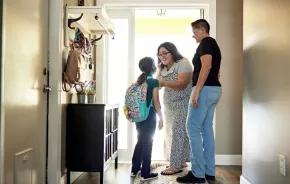 Andy, a bright middle schooler, loved math, but when it came to tests, his scores would end up in the low B/high C range, his calculations cramped, barely legible and taking up every inch of space on the paper. He understood the concepts, but Andy just couldn’t align the numbers neatly enough on the page to follow them correctly.
Andy, a bright middle schooler, loved math, but when it came to tests, his scores would end up in the low B/high C range, his calculations cramped, barely legible and taking up every inch of space on the paper. He understood the concepts, but Andy just couldn’t align the numbers neatly enough on the page to follow them correctly.
Andy was diagnosed with dysgraphia, a learning disability that makes it hard to transfer to the paper what is in his head. “It’s like going through life having to write everything with your left hand, if you are right-handed,” says his mother. “It takes a lot more effort, and the results are really messy.”
Andy’s mother worked with his teacher to make accommodations: copying his tests on graph paper so he could line up numbers more easily, and printing just one problem per page so he would have enough room to write. “It made all the difference in the world,” his mother says. Andy is now pursuing advanced math in high school.
While this story has a happy ending, the academic journey of children with learning disabilities often involves hard work and frustration, says Cindy Dupuy, Ph.D., a Seattle-area learning disabilities specialist. To give their child the best shot at school success, parents must know their rights and be knowledgeable about their child’s disability, she says. “They should also develop a positive relationship with their child’s school and teachers.”
Services guaranteed
A learning disability (LD) can affect a person’s ability to read, write, compute or speak. The condition can make it harder for kids to do well in school, even if they’re of average or above average intelligence.
The U.S. Department of Education guarantees all individuals “free and appropriate public education.” That means school districts must offer children with learning disabilities special accommodations and services to help them succeed. The students may be eligible for a written Individualized Education Program (IEP) through their school, which lays out services and sets goals for the year.
These services can include offering students extra time to complete assignments or tests, giving them peer help for notetaking, electronic spell checkers, more frequent feedback or extra textbooks to keep at home to review material. Learning disabled students often receive one-on-one or small-group academic tutoring.
When a student with a learning disability begins the year, parents should talk with the teacher to discuss how best to communicate (phone, email or in person) as well as how often, says John Conom, a special education teacher at Lowell Elementary School in Seattle. “Parents and teachers are equal partners,” says Conom. “Parents shouldn’t wait for a progress report to come home if they have a question or are noticing a change that needs to be discussed.”
Make it a team effort
The extra services and accommodations required by an IEP can add to the workload of a teacher, so it’s important for parents to help wherever they can, says Andy’s mother. She tells teachers, “This is what my child has a hard time with, here is what we think will help, and I can help you implement it.” For example, she offered to do the extra copying required for her son’s multipage tests on graph paper.
Parents should join with their child’s teacher and make everything a team effort, says Dupuy. If there is an issue with keeping track of homework assignments, handing them in or meeting deadlines, parents should talk about it up front with the teacher, get a plan in place at home and discuss how to be notified when a problem crops up. “All parties should feel supported,” she says.
Delia Jampel, Ph.D., a Mercer Island clinical psychologist, finds that some teachers are opposed to accommodations such as giving a child more time to take a test or lending them a computer to takes notes. “But would you tell a child who needs glasses they couldn’t have them?” asks Jampel.
Parents often need to be tenacious to secure the help their kids need. “Schools are understaffed and underfunded and may try to talk you out of services,” says Laurie Ford, a Seattle mother of a child with learning disabilities. “They may reduce the amount of minutes for one-on-one academic tutoring sessions, or tell you your child is doing fine and should stop leaving the classroom for extra help,” she says.
Know your rights
When she thought her child still needed a service, but the school didn’t, Ford asked for her child to be tested to see if he qualified for the help she was requesting. “He qualified, and they gave it to him,” she says. She tells parents to be firm and know their rights. “Staying calm and focused on what you need is a more effective way to go than becoming emotional.”
In some cases, parents bring an advocate with them to their child’s IEP meetings. This advocate might be a private practitioner or a representative from Partnerships for Action Voices for Empowerment (PAVE). PAVE, a non-profit organization, helps families understand the education system and find resources for their learning disabled child.
What if the school isn’t meeting your child’s needs? “When a child has stopped progressing or is going backwards academically, it may be time to bring in outside help,” says Ford. Conom advises parents to make sure the outside resource works in conjunction with programs already in place at the child’s school. “The flow of communication between all parties is key,” he says.
The traditional school setting doesn’t fit every kind of learner, says Jampel. “If you can bolster the child’s strengths and get them through the system, they’ll end up in the real world, where they will find places to flourish.”
Julie Weed is a local author and freelance writer for The New York Times and other publications. Her website is juliebick.com.









